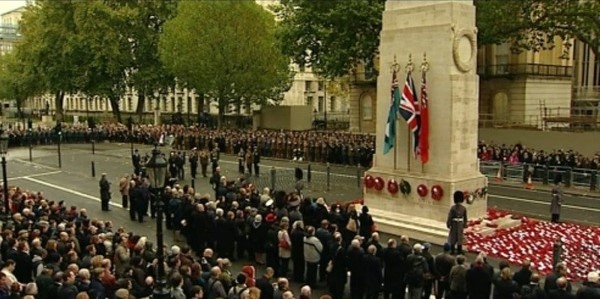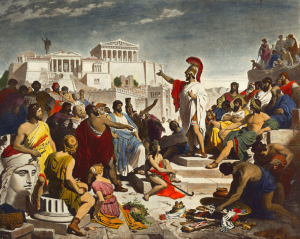
November 15, 2017, by Helen Lovatt
Why remember the fallen?
A Perspective from Ancient Greece
Edmund Stewart reflects on Remembrance Sunday and on teaching ancient Greek military history.
By a happy coincidence, the lectures for first-year undergraduates at Nottingham on the topic of the Greeks at war have fallen before and after Remembrance Sunday. Such a coincidence provides ample room for reflection on how different societies memorialise the supreme sacrifice paid by those who have fallen in war. In classical Athens, as the historian Thucydides tells us, the dead were mourned together in a public funeral. All those who wished could process with the coffins to the place of burial, there to hear a eulogy delivered on behalf of the city by one of its leading statesmen. Superficially such an event may be said to resemble our march-past at the Cenotaph. Yet there are many differences. The British armed forces number around 144,000 personnel and another 2.6 million may be classed as veterans. Yet as many as 50% of all veterans are over 75 years of age and those currently serving represent only a tiny proportion of an overall population of 65 million. War is then not something to which most of us are accustomed. This morning neither I nor my students had any first-hand knowledge of what we were attempting to study. The Greeks of the classical period were never so lucky.
The Greek city-state: a nation-at-arms
In an earlier age, young men preparing at Oxford and other universities to depart for the battles of the second world war were themselves taught by veterans of the first, such as C.S. Lewis or J.R.R. Tolkein. Similarly, in the ancient world, Thucydides, the historian of the Peloponnesian War, was also one of its combatants. Both young and old knew much about war: the poet Tyrtaeus, in addressing the youth of Sparta, says that they know what it is like to pursue the enemy and to be pursued in turn on the battlefield. Wars in the ancient world were less bloody than modern conflicts in terms of the numbers of casualties, but they were generally longer and more common. To the great mass of the Athenians then, as for the Spartans, the grief for lost comrades and family members was very raw, as it can only be today for a handful of forces-families directly affected by recent conflicts in Iraq and Afghanistan.
What then is the purpose of events such as Remembrance Sunday for the rest of us? Of course, one answer is that they serve to honour those who gave their lives for our freedom and safety. Yet Thucydides provides another possible reason in his account of Pericles’ funeral oration for the Athenian dead. Pericles begins not with any reflection on the individuals who have fallen, but with their ancestors and then the constitution of the city for which they fought and died. He has in mind at the opening of his speech:
‘that part of our history which tells of the military achievements which gave us our several possessions, [and] of the ready valour with which either we or our fathers stemmed the tide of Hellenic or foreign aggression.’
For Pericles, it was important to remind the living that they belonged to a great city. They knew that Athens had once been burned by the Persians and left in ruin, but that their ancestors, ordinary men and women, had refused to submit to tyranny and won out through courage and endurance. The British at the Cenotaph can similarly take heart in thinking that, whatever setbacks may ensue and however disunited the state may seem, it was built to weather many more and worse troubles. Those of us whose job it is to make the case for the ‘relevance’ of the Humanities should not forget that history is a great source of encouragement. It may not be surprising that a first world war veteran, J.R.R. Tolkein, made Sam Gamgee articulate a similar idea in the Lord of the Rings:
‘It’s like in the great stories, Mr. Frodo. The ones that really mattered. Full of darkness and danger they were. And sometimes you didn’t want to know the end… because how could the end be happy? How could the world go back to the way it was when so much bad had happened? But in the end, it’s only a passing thing… this shadow. Even darkness must pass.’
No comments yet, fill out a comment to be the first

Leave a Reply